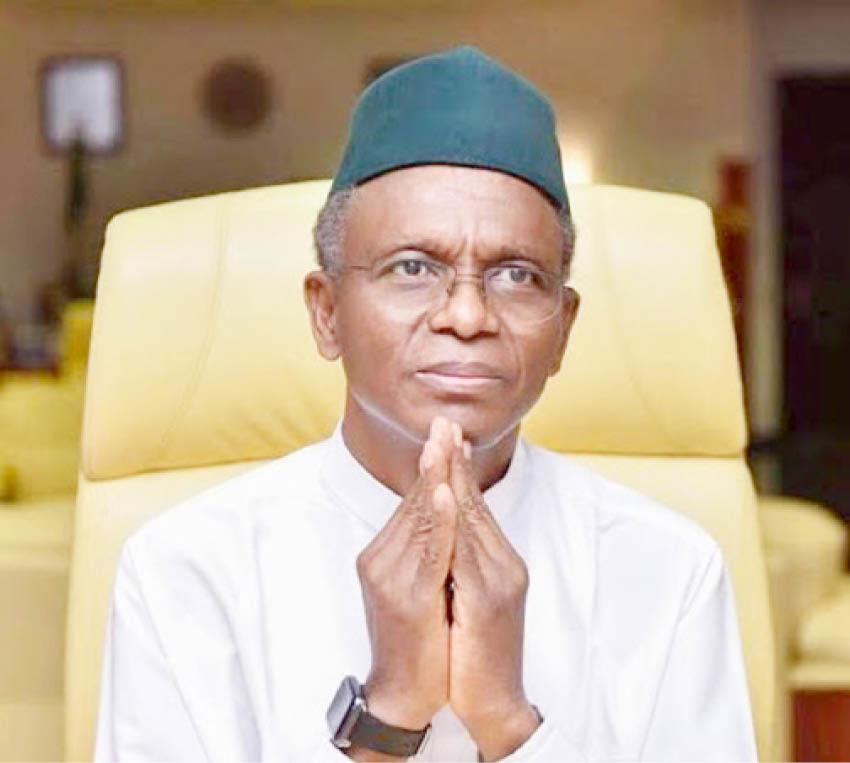In the movie Dante’s Peak, a memory from my adolescence, the character Harry Dalton defined the making of a disaster. “My 9th-grade science teacher always said that if you put a frog in boiling hot water,” he said, “it would jump out.” The frog, when put in cold water, and heated up gradually, he continued, “would slowly boil to death.” This is what it means to be accustomed to a destructive practice or system, we don’t know it kills until it implodes.
This theory of disaster propounded in Dante’s Peak has played in favour of Governor Nasir El-Rufai in his latest showdown with the members of the Nigerian Labour Congress over the decision to lay off “redundant” workers. It has also polarized discussions around governance and inspired philosophical analyses of the essence of such drastic reforms when his state is at its economic low.
Kaduna state, like the rest of the country, is this frog in the cold water being heated. The argument that it’s absurd to spend 90% of the state’s resources on 100,000 civil servants in a state with about 9 million people, isn’t misplaced. It’s a cross-generational dilemma that had stalled and frustrated the dreams and ambitions of promising politicians and bureaucrats in the past sixty years.
El-Rufai isn’t the author of this idea of retrenchment and neither is he the first to cry out that the ratio of recurrent expenditure to the capital is criminally outrageous. It’s a heritage of our cultural disinterest in the heating up of our national water, which has produced a cascade of disasters that has led us here. Since inheriting about 30,000-person federal civil service in 1960, so many attempts have been made by our governments to “reform” what’s become a glorified charity organization.
The Morgan Commission of 1963 set the tone for the theatrics when it retained and indigenized the colonial administrative structure, and introduced a minimum wage for all regions. Since then, successive governments intervened to make sense of the civil service. In 1971, the Adebo Commission attributed the shortage of senior civil servants to a “low remuneration package.” The next year, the Udoji Commission recommended a coordinated salary structure for both federal and state civil services. This was followed by Dotun Philips Commission (1985), Decree No. 43 (1988) and Ayida Review Panel (1994).
When Chief Olusegun Obasanjo took control in 1999, he was instantly drawn to the futility of the past reforms, and thus, he embarked on restructuring the civil service by downsizing its workforce and privatizing perennially mismanaged public enterprises and national assets. The first set of redundant workers disengaged were 35,700 and, despite the consequence outrage, the government stood its ground in explaining that the civil service had become a broth with too many cooks. The Steven Oronsaye Panel of 2011 also underlined this dysfunction, asking the government to abolish and merge 102 government agencies and parastatals and reduce the number of statutory agencies from 263 to 161. It was a sincere attempt to cut the cost of governance.
As the Central Bank of Nigeria Governor in 2012, Sanusi Lamido Sanusi broke this down at an event in Warri, Delta State, when he advised the nation to cut down its workforce by half. “At the moment, 70 per cent of Federal Government’s revenue goes for payment of salaries and entitlement of civil servants, leaving 30 per cent for development of 167 million Nigerians,” he said. “That means that for every naira government earns, 70 kobo is consumed by civil servants.” The backlash was immediate, and understandably so. The then NLC boss, Abdulwaheed Omar, accused Sanusi of advocating “anti-people policies,” and it resonated with the nation.
Like Sanusi then, El-Rufai has become the devil on the cross. The solution to the challenge of recurrent expenditures in Nigeria is a painful conversation in an alarmingly poor country, but it’s one we must have. We’ve been insincere about implementing these reforms since gaining political independence, and the worms have only eaten deep into the system. What’s being managed as bureaucracy in Nigeria is an undeniable charity organization, one designed to service political patronage networks.
But where el-Rufai and others have failed is the refusal to acknowledge that the structure they inherited is unfortunately what has also kept Nigeria going. This argument is populist, but it’s not untrue. The Nigerian civil service operates like the camp of internally displaced persons and serves as the source of life and livelihoods to the economically displaced, citizens who have failed to secure an alternative means of earning because of the lack of foresight and creativity of the same politicians in overturning the economy.
But this doesn’t make el-Rufai’s solution wrong. It makes it classist and ill-timed. It’s a decision easy to make in one’s air-conditioned mansion. But not every citizen is socially privileged. As long as this class privilege exists, those who advocate the “right-sizing” of the civil service, which is akin to dismantling an IDP camp in a country still at war, risk being labelled unsympathetic and classist.
This class privilege also reminds me of a conversation I had with a few friends some years ago. One naive fellow, from a family that chanced upon immense wealth through political patronage, argued that it’s impossible for anyone above 20 to not have a thousand Naira. Only in an intentional case of laziness was that possible, he said. He was countered by a more experienced friend and the debate lingered for almost an hour. Even though there was no consensus, the fact that such an argument was tenable presents a glaring disconnect from our reality. But el-Rufai’s dilemma is much worse than that, it’s what happens to these beneficiaries of our charity after their disengagement in a state that’s become a criminal enterprise for the unwanted “self-employed”—the bandits and kidnappers overpowering the government.

 Join Daily Trust WhatsApp Community For Quick Access To News and Happenings Around You.
Join Daily Trust WhatsApp Community For Quick Access To News and Happenings Around You.


